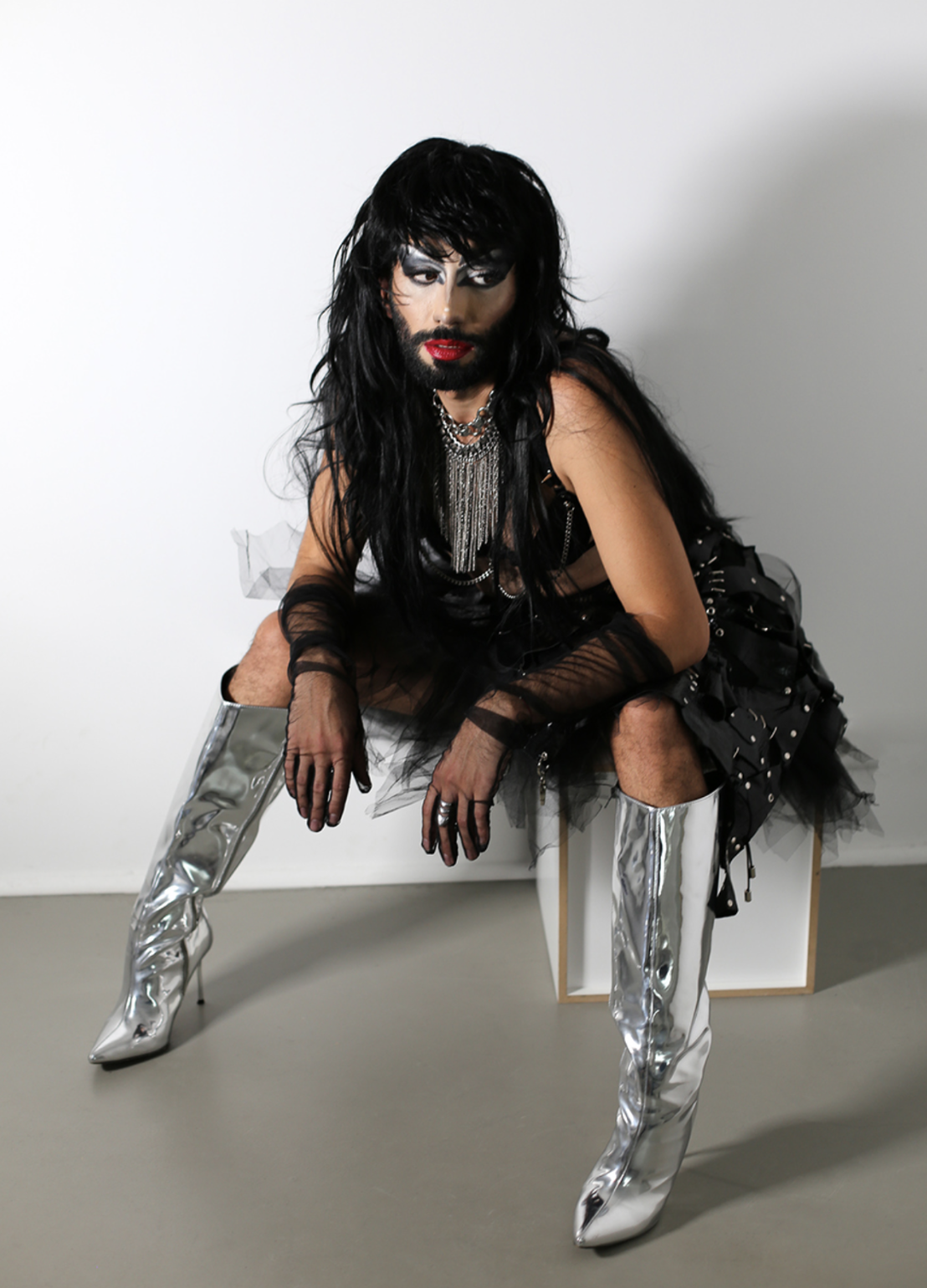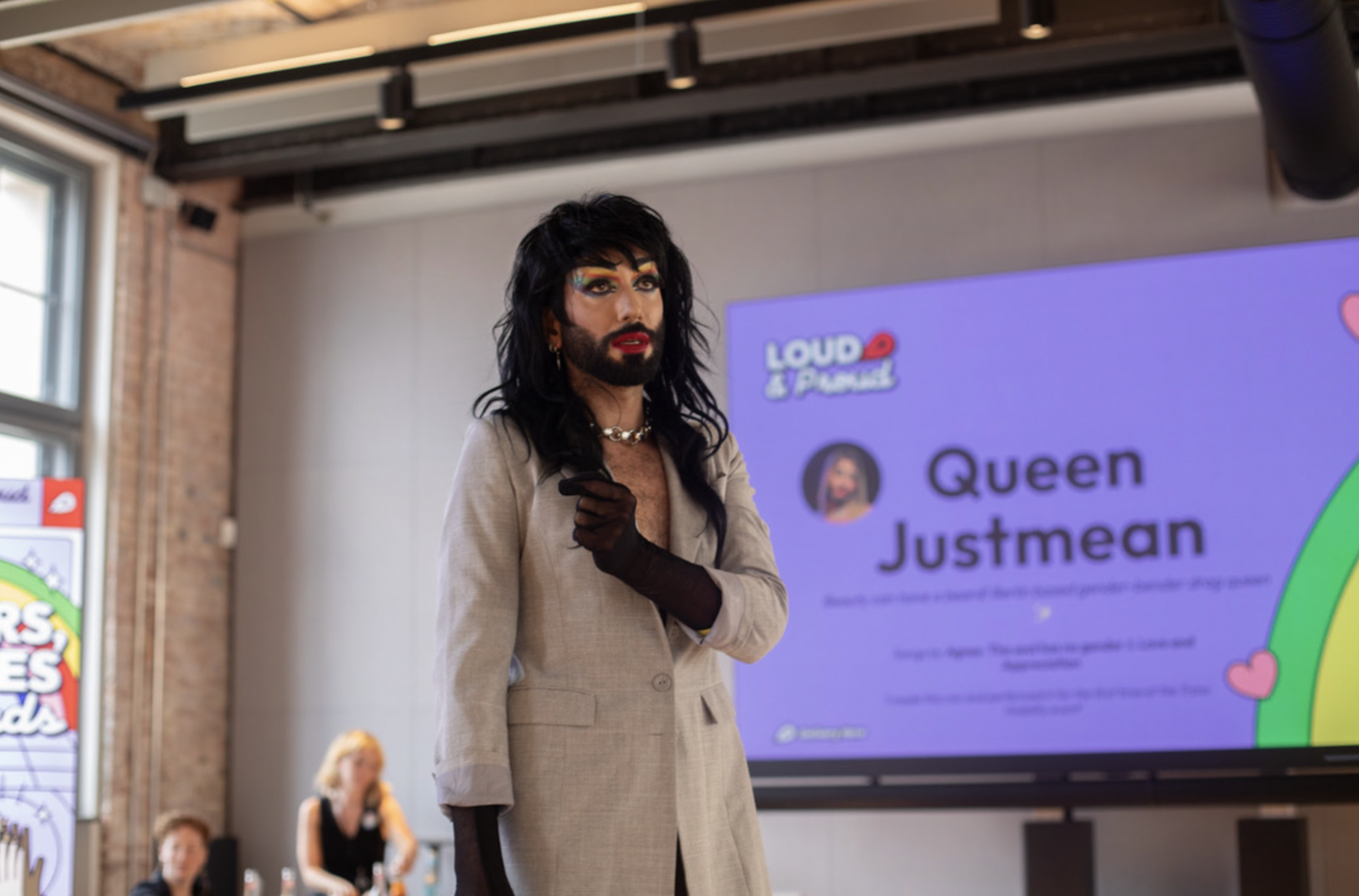Queen JustMean: Disrupting Gender Norms Through Performance Art
Bold cat eyes and fierce red lipstick against a lush beard and beautiful skin tone. A DIY dress, embellished heels, and a proudful strut. That's Queen JustMean — a Genderfuck drag queen born and raised in Azerbaijan, now living in Berlin. The performance diva has been appearing on queer stages all over Berlin, from clubs to corporate pride events and major festivals.
Having made her first official stage appearance just a year ago, she has since made a statement in Berlin's queer scene, standing for queer rights, self-expression, and community-building.
Just in time for Christopher Street Day (Berlin’s Pride celebration), I sat down to speak with the queen, who shared her personal journey—one of change, empowerment, and taking up space.
EH: You were born and raised in Azerbaijan, lived in Budapest for a while, and moved to Berlin five years ago. What was the build-up to becoming a drag queen?
QM: I was raised in a conservative family. While toxic masculinity traits weren’t imposed on me, I was witnessing a very patriarchal family dynamic. I realized that my father’s behavior towards my mother wasn’t right, and I wanted to break free from this environment. I matured early as a manly man, despite being gay.
Watching RuPaul’s Drag Race sparked my interest in drag, but my desire intensified when I decided to accept my feminine side. Typically, I present myself as this muscular guy, protective of my friends. When people speak badly about us, I would immediately assume this protector position. For a long time, I’ve wanted to express my femininity in a way that goes beyond showing up as queer or more feminine in daily life. Instead, it’s something that wants to be grandiose.
EH: There's this very muscular side of you and then the incredibly feminine side. Can you speak more about this sense of duality?
QM: Exactly. I try to balance these two sides to give each an opportunity to express itself, so neither feels neglected.
Initially, the only place I could express my femininity was at queer parties. Because of that, I took it very seriously, getting annoyed if interrupted while dancing. I wanted to have 20 minutes just to myself to be fully expressive.
My friends noticed me on the dance floor, and one invited me to perform at his apartment/club space, where he gives a stage to emerging artists. This happened twice last year and boosted my confidence.
My first official stage performance was at the Pepsi Boston Bar in SchwuZ, Berlin. I saw how the audience was cheering, and I knew I wanted to be at this level. This brought so much peace to my daily life. I now accept my masculine side and outfits too. I want to wear more color, but I don't feel comfortable—yet in drag, I wear colors, glitter, and lots of accessories. It’s as if all the fantasies I've dreamed of since childhood are coming to life.
On stage, I learned a lot. I initially thought that I had to meet certain standards of femininity as a drag queen, but I realized that drag for me is expressing femininity without needing to completely transform into a woman. I have a beard, I’m hairy, and I don’t wear breastplates, but my costumes are very feminine. That's my self-expression, and I don't compare it to others.
EH: Well, gender and queer activism are about accepting all your different colors and not conforming to conventional feminine or masculine versions.
QM: That’s true for drag too. For a long time, I saw drag as an entertainment show where a man becomes a glamorous woman. But lately, RuPaul's Drag Race has become more diverse, showing that drag is for everybody. Drag is an art form—it’s an expression, and its meaning has evolved for me.
EH: Would you say that you are voicing bigger challenges within the queer community through your art and the events you’re a part of?
QM: I would say that if you’re authentically expressing yourself as a queer person, as a woman, as a minority, the moment you step out from your flat, you’re making a statement; it's a political statement. You are standing up against the norms, so you will be immediately targeted.
We are able to live openly because people in the ’70s and ’80s fought for our rights. They had the courage to go out as a transgender woman, gay, or queer; that’s why we have this freedom now.
Some gay men don’t want to be associated with more feminine and trans people, but I remind them that they can be openly gay because these exact people have rioted. These individuals are the pioneers of queer freedom, and we need to be more aware of it.
Recently, I participated in events organized by queer activists. For instance, The Darvish, a famous Syrian performer, belly dancer, and queer activist supporting people of color, has booked me twice in events that gave a platform to Middle-Eastern artists.
The last event we had was a brunch at Kanaan restaurant for queer religious people from a local queer mosque, where people of all religions and genders can coexist. The mosque is founded by Seyran Ateş, a lawyer and women’s rights activist. I performed the songs “The Soul Has No Gender” and “Love and Appreciation” by Agnes, and gave a small speech about my attempts to fix my “gayness” and later accepting that I’m actually not a sinner. I just want to be loved, and how simple could that be? That’s what everybody wants, regardless of their gender.
Unfortunately, even in Berlin, which strives to be open, due to the nature of this organization, it’s targeted. A week after the event, the restaurant where I performed was attacked. Some haters just don't want queer people to have that space.
EH: Is Christopher Street Day also a target? How has your experience been in the past few years?
QM: I've been to two pride marches in Berlin, and this year was my third. They are more or less protected by the police—something that’s rather uncommon for other cities. A lot of straight allies are joining too. However, this year, I decided not to attend as my drag queen persona, as I don’t feel entirely safe on the streets. Also, drag feels so grandiose—it belongs to the stage where I can fully enjoy it. For CSD, I want to express my real-life self. It’s my personal pride, whereas she has her own. I want to be with my friends and my boyfriend and be comfortable.
EH: Did you have any drag queen idols growing up, or did they come into your life later with RuPaul's Drag Race?
QM: As a millennial, I didn’t have drag queens as idols growing up. Like many millennial gay guys, I idolized divas like Britney, Beyoncé, Mariah Carey, and, of course, Lady Gaga. She's a piece of art and represents everything that we wanted to be: famous, seen, and performing on stage.
Drag entered my life in 2014 with RuPaul. There are a lot of drag queens that I love, especially Conchita Wurst, who is a true inspiration.
EH: Besides inspiration and idols, have you had any mentors or a supportive community along your journey?
QM: I was surprised by Berlin’s openness to new queens; the city has a place for everyone. At first, I reached out to queer spaces and queens, and connected with Aurah Jendafaaq, another bearded queen from Azerbaijan, who is more genderfuck than I am. She incorporates the Azerbaijani culture into her performances, as she left the country at a young age. Aurah was thrilled to meet another queen from our region. Here, in Berlin, there are mostly BIPOC, Asian, or African-American queens who have their own collectives, but Middle-Eastern and Caucasian representation is limited.
Aurah is a motherly protective figure and formed a drag house with me and another drag queen. She invited us as back-up dancers to her performance at Fusion Festival, one of Germany’s biggest electronic music festivals. Because we had such a strong number, they let us go on stage at the end of the day and close the proram, and I might even have my own performance at Fusion next year, thanks to Aurah.
EH: It sounds like you found your space where you belong. Do you think you could have had your big break in another city?
QM: Probably not. Moving to Berlin, I realized that I had a lot of judgment towards the gay community. I began educating myself a lot and living more authentically. I feel like I needed to have this journey here.
You Might Also Like:
“Migration Is an Issue That Affects Everyone”: An Interview With Yu-Wen Wu
Humans, Plants, Gold, and Dust: David Anaya Maya Queers the Limits of Art



